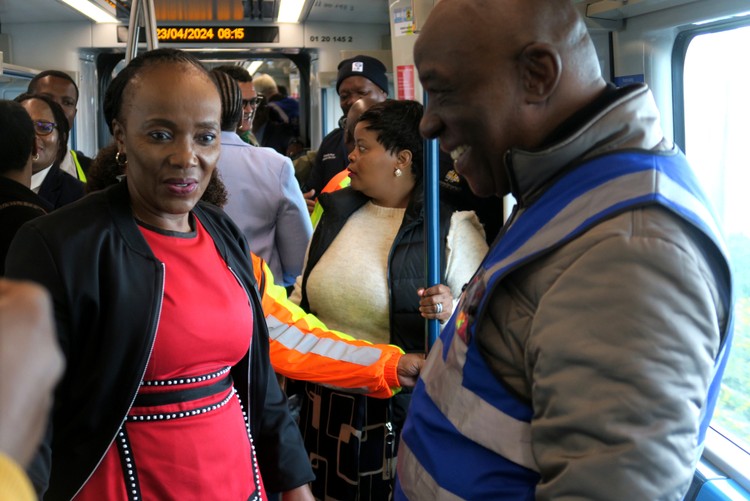
23 April 2024
Minister of Transport Sindiswe Chikunga makes her way through carriages on the Fish Hoek to Cape Town train on Tuesday morning, stopping to speak to passengers along the way. Photo: Steve Kretzmann
Full operation of the Metrorail Central Line, which services Khayelitsha and Mitchell’s Plain, has been delayed by another month, to May, according to Minister of Transport Sindisiwe Chikunga.
Last month, during an oversight visit to train stations on the Central Line by Parliament’s Standing Committee on Public Accounts (SCOPA), Metrorail regional manager Raymond Maseko told the committee that trains would be operating from Cape Town station to Khayelitsha’s Nolungile train station “by April”.
In July last year, Passenger Rail Agency South Africa (PRASA) CEO Hishaam Emeran told SCOPA the Central Line would be fully operational by March this year.
The latest statement by Chikunga comes after she took the 8:10 train on the Southern Line from Fish Hoek to Cape Town before cutting the ribbon on the 200th “Isitimela Sabantu” train manufactured locally in Gauteng.
PRASA has been struggling to reopen the Central Line due to ongoing theft and vandalism in late 2019, following the rail agency cancelling security contracts.
During the Covid lockdown, thousands of families and individuals who could no longer afford backyard rentals built shacks on the line and in the rail reserve.
Hundreds of households have since been relocated, and the Central Line has been partly operational since March last year, but only runs as far as Nyanga, with only one train in the morning and one train in the evening. The train does not stop at a number of stations between Nyanga and Cape Town.
The train to Khayelitsha and the branch line to Mitchell’s Plain do not operate at all.
Workers in these areas told GroundUp the lack of train services meant they spent more than R1,000 on taxi fare per month in order to get to work. Cleaner Anele Gxekwa, from Crossroads, said he spent R1,200 of his R3,500 a month paycheque on taxi fare, whereas monthly train tickets used to cost less than R200.
The affordability of the train as a means of public transport was highlighted by passengers Chikunga spoke to as she made her way through the carriages on the Southern Line on Tuesday.
Mavis Sobethwa, who lives in Masiphumele and catches the train from Fish Hoek to Woodstock, where she has part-time domestic work, didn’t realise it was the minister who sat down next to her. “Hau!” she exclaimed loudly when it dawned on her, to laughter from her friends and Chikunge.
Sobethwa told Chikunga the train saved her a lot of money and it was safe.
She told GroundUp she would have to pay R17 for a taxi from Fish Hoek to Wynberg and another R17 for a taxi from Wynberg to Woodstock. She also has to pay R18 for a taxi from Masiphumelele to Fish Hoek, yet a train ticket from Fish Hoek to Woodstock costs just R9.
Sobethwa said she was paying taxi fares to Wynberg over the past two weeks while the Southern Line was only operational from Retreat to Cape Town, because a mast for overhead transmission lines blew over during gale-force winds on 7 April. The line reverted to full operation from Fish Hoek on 21 April, a day before the minister’s trip.
Sobethwa said the new Isitimela Sabantu trains were much safer than the old yellow and grey carriages, as they were fitted with onboard CCTV cameras.
She said in October last year “guys tried to rob a phone” from a passenger, but were caught on camera. The train stopped, and a culprit apprehended. She was also happy that since March, trains now ran every 20 minutes rather than once every 55 minutes as was previously the case.
Passenger Judith Sithole, who was sitting next to Sobethwa, told GroundUp the train allowed them to talk to one another and “share ideas”. Sithole pointed to several other women sitting next to and opposite her, and said they were all friends who had met on the train, and had started a stokvel together. She said this would not have happened if they were travelling by taxi.
Passenger Stephen Campbell, who travels between Fish Hoek and Rondebosch, said it cost him R150 per month to commute to work. “It’s almost too cheap,” he told Chikunga.
Campbell said the train was safe enough for him to take out his phone or laptop and deal with his emails before getting to work. “I used to take the old [grey and yellow] train. It was unsafe,” he said.
He said Cape Town needed a functioning train service so that people did not have to use the roads, which were “a nightmare”. It took him 35 minutes to get to work by train but an hour by car.
In her speech after arriving in Cape Town, Chikunga said PRASA was procuring 600 “new modern high tech trains” manufactured in Dunnottar, just south of Springs in Gauteng. This was part of the rolling stock fleet renewal programme which was expected to create 1,500 direct and 8,000 indirect jobs. The fleet renewal programme was linked to training programmes, small business development partnerships and bursaries.
She said countrywide PRASA had reopened 31 of 40 corridors it operated across five municipalities. In the Western Cape, 12 of its 14 lines had been “recovered”.
One of those not yet recovered was the Central Line.
“Progress is being made to recover the Central Line from Phillippi to Nolungile and trains are expected to run by May this year, adding to the services already running from Cape Town to Nyanga on the Central Line,” said Chikunga.